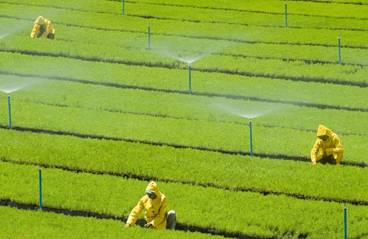O ground, formed by mineral agglomerates and organic matter from the decomposition of animals and plants, is the surface layer of the earth's crust. Soil is essential for growing various foods.
This natural element serves as a source of nutrients for plants, which are used as food by humans and animals. The plantations have been carried out for thousands of years, guaranteeing food and being a source of income through the commercialization of the cultivated products.
Soil composition directly affects plantations, as the amount of nutrients present in a soil reflects on agricultural production. Nutrient-rich soils have great fertility, a positive fact for crops.
Nutrient-poor soils, on the other hand, need adaptations for cultivation. In this sense, several agricultural techniques were developed to alter the soil and make it suitable for plantations.

Plantation with artificial irrigation system
Some measures must be taken to carry out the plantations. Among the most used techniques in agriculture
they are analysis of soil composition, soil drainage, plowing, fertilization, crop irrigation, use of pesticides, among others.However, some agricultural techniques have caused several environmental problems, such as ground pollution by pesticides, deforestation, fires, contamination of water resources, erosion, among others.
By Wagner de Cerqueira and Francisco
Graduated in Geography



